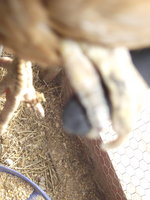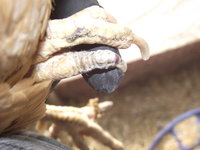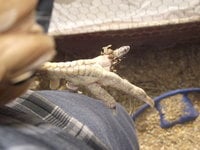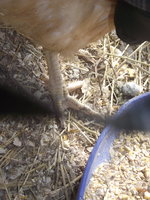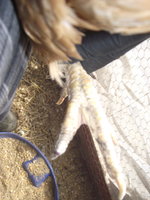Noah Porter Md
In the Brooder
- Dec 28, 2017
- 42
- 23
- 24
Hi, My name is Noah and i believe i have a problem, I went out to the coup this morning to find one hen acting vary sluggish and i picked her up to check to see if she had sour crop because earlier this year another hen had it, she did not so i picked up her feet to check to see is her feet were ok and a noticed that some toenail's were growing downwards instead of outwards and then i noticed that the tip of her to was black with some red in it, and also noticed she didn't like to be touched there. Immediately i went to google looked up frostbite and it looks similar so i was wondering if could put like Polysporn or this other stuff i have access to called Dog Bomb It's supposed to help with dry dog pad's. now it is starting to warm where i live forecast says its supposed to be minus nine to tonight and feel like minus sixteen i do have a heated water dish in the coup and a light which seems to give off heat should i let this roll or should i just put some Pollysporn and a bandage around the foot or what? please help any reply is a good one Im fairly new to this and feel so bad that she is in pain.
I found this helpful is it true in these circumstances?
https://www.raising-happy-chickens.com/backyard-chickens-frostbite.html
Weather forecast says that it will start warming up soon i dont know if this helps.
Also i can seperate her from the flock if need be but please reply soon my dad's a survivalist and has tought me that frostbite is really bad and if you get warm slowly please help.
Also she does move around alittle.
Also toe is similar to this
https://countrysidenetwork.com/daily/poultry/feed-health/chicken-frostbite-treatment-prevention/
I found this helpful is it true in these circumstances?
https://www.raising-happy-chickens.com/backyard-chickens-frostbite.html
Weather forecast says that it will start warming up soon i dont know if this helps.
Also i can seperate her from the flock if need be but please reply soon my dad's a survivalist and has tought me that frostbite is really bad and if you get warm slowly please help.
Also she does move around alittle.
Also toe is similar to this
https://countrysidenetwork.com/daily/poultry/feed-health/chicken-frostbite-treatment-prevention/


